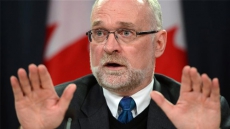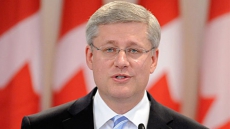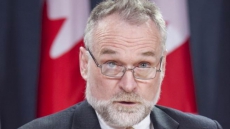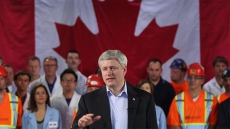OTTAWA — A federally commissioned study says police must be more flexible and seek out partnerships to succeed in the 21st century.
The report by the Ottawa-based Council of Canadian Academies says the one-size-fits-all model of today's municipal police service is a thing of the past.
Officials say the cost of policing is steadily rising — hitting almost $13 billion in 2011 — even though the rate of reported crime is falling.
Among the reasons: increases in police officer salaries, higher costs for equipment and fuel, and new challenges such as cybercrime and dealing with people who have mental health issues.
As a result, Public Safety Canada — with support from Justice Canada and the RCMP — asked the council, an independent research body, to have an expert panel look at available evidence on ways to improve policing.
The panel found police now operate as part of a "safety and security web" — comprising private security, health professionals, community and municipal groups and other government organizations.
"This web presents both the central challenge and the central opportunity for today's police," a council summary of the 212-page study says.
"Working effectively within and through this web — rather than as isolated entities — will allow policing organizations to better respond to existing and emerging issues."
Operating within the "safety and security web" means police can decide when to draw on the assets of other players, the summary says.
"This means that, in some instances, police are leaders, while in others they are supporting partners."
The panel points to the Community Mobilization Prince Albert Initiative in Saskatchewan that brings together police and more than a dozen other community agencies twice a week to discuss high-risk situations and discuss responses.
Since beginning the project three years ago, Prince Albert has seen a notable drop in its violent crime severity index, the study summary says.
The panel wants to tear down the illusion that police alone can solve vexing societal problems, said participant Benoit Dupont, director of the International Centre for Comparative Criminology at the University of Montreal.
However, the panel says police must remain the central, co-ordinating agency in the security web.
"The police has this unique mandate to act on behalf of the common good, and that's something that we certainly don't advocate changing," Dupont said.
When police break the law or breach public confidence, they are accountable under the law or through oversight bodies, the summary notes. But similar accountability measures are not in place to the same degree for private security firms and other players.
"As these non-police actors come to play more extensive roles and engage in more sophisticated partnerships, the need to develop accountability structures for all actors in the web is expected to grow," the summary adds.
The panel suggests more research be done.
"We are not suggesting a model per se, we are just highlighting a number of challenges and a number of potential solutions," Dupont said.
"It's going to be for the politicians and communities in Canada to decide for themselves what they really want."





